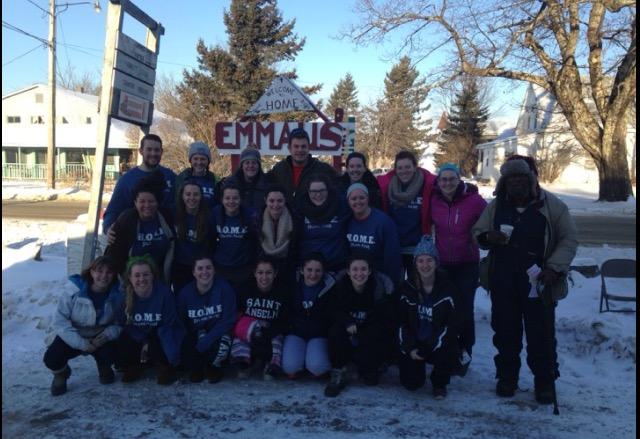Winter Breaks yields lifelong experience
January 31, 2015
Many students at Saint Anselm College are returning to campus for the 2015 Spring Semester with a new outlook on life thanks to recently returning Service & Solidarity Missions, or Winter Break Alternative (WBA) groups.
The eight student-led groups, this year consisting of 118 students all together, left on January 2nd and returned a week later. The groups serviced locations throughout the United States (as well as at a location in the Dominican Republic) in a variety of ways, including helping in schools, with building projects, and at soup kitchens among many other volunteer tasks.
Each year the WBA program can only be pulled off after careful and lengthy preparations, but is certainly worth it for students who come back with an enriched view of what it means to be human and a part of a community.
As the 25th year of the program, there is perhaps an even greater sense of accomplishment for returning groups when reflecting on the idea of such a long-standing Anselmian tradition. Susan Gabert, the Director of Campus Ministry, has been working as coordinator of the program for 21 years and has overseen the transition that the hundreds of participating students go through from first deciding to go on the trips to returning home.
“The trips really broaden an otherwise limited experience of the world for most kids,” she said about what she notices in students returning from service.
Olivia Ashburne went to Orland, Maine to work with Homeworkers Organized for More Employment (H.O.M.E). She bolsters Gabert’s remarks in saying, “Being in Orland really helped to change my perspective on my own life. It reminded me the importance of being part of a community, loving what you do and most importantly it reminded me that you cannot let your past stop you from doing the things that you want to do. Those are skills that I will not be able to learn in a classroom.”
While with H.O.M.E., Ashburne and her group chopped wood, painted, organized rooms, did inventory, worked with kids in the daycare and helped with other small tasks. Such activities were common among other WBA groups. Gabert documented their exploits and activities often on the Saint Anselm College blog, and briefly discussed the daily tasks with which each group contended.
The New Orleans group served at the St. Joan of Arc School, an elementary school aided by Saint Anselm College since Hurricane Katrina, and helped in pre-K classrooms, as well as with cleaning and organizing of the school. The Dominican Republic group aided the Nuestros Pequeños Hermanos home, playing with children and working in the home, as well as working with a building project in an area where Haitian refugees reside. The group that went to Camden, New Jersey were joined by groups from three other schools in their efforts through the Romero Center, including in work at a nursing home, in a soup kitchen, and with children at a daycare.
Such a variety of experiences for groups requires much preparation from both Gabert’s end and the students’ end. Lexy Ashburne, Olivia’s sister, is planning on attending the Spring Break Alternative (SBA) trip to David, Kentucky to assist with at-risk youth at The David School.
She briefly reflected on the experience she has had in preparing for the trip. She said she has had to spend a lot of effort in fundraising, however, “the best part of preparing for the trip has been getting to know my group members. My trip leaders have helped us get to know each other by organizing dinners and putting on fundraisers such as bowling night or raking.”
Certainly the Anselmian idea of community is fostered on campus not only through the preparations that students have to take to get ready for their service experiences, but also throughout the trips themselves. Olivia Ashburne remarked, “Over the course of the week I met some of the most amazing people; people who I will never forget.”
About the sense of community present in both the on-campus and off-campus parts of the trip, Gabert said, “What we bring as Anselmians to these locations is different. The sense of community here on-campus helps the students get involved with the communities during the trips right away. We are distinctively different.” These trips definitely highlights what it means to be an Anselmian.



